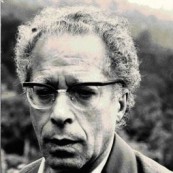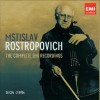Composers
Fernando Lopes-Graça (Tomar, 17 December 1906- Parede, near Cascais, November 27, 1994) was a Portuguese composer and conductor of the 20th century. He worked both as a contemporary music composer and as a musicologist. His major influences came from Portuguese popular music, that he studied, continuing the work of other musicologists, like Francisco de Lacerda. He was a member of the Portuguese Communist Party and was a strong opponent to "Estado Novo" and its leader António de Oliveira Salazar. He completed the "Dicionário de Música" (Dictionary of Music), started by his teacher, Tomás Borba, himself a composer.
1906: December 17: birth in Tomar (where he would start his piano studies).
1924: becomes a student at the Conservatório Nacional de Lisboa.
1927: becomes a student of Vianna da Motta's Classe de Virtuosidade.
1931: obtains the Composition Degree. In the same year he is arrested and expelled to Alpiarça.
1934: wins a scholarship to study in France, which he is later denied for political reasons.
1937: goes to Paris, where he studies with composition and orchestration with Charles Koechlin.
1938: The "Maison de la Culture de Paris" commissions «La fiévre du temps» (ballet-revue). Harmonisation of traditional Portuguese songs.
1940: Wins the composition prize from Círculo de Cultura Musical with his 1st Concert for Piano and Orchestra.
1941: receives an invitation from Tomás Borba to teach at the Academia de Amadores de Música.
1942: wins a prize from Círculo de Cultura Musical for «História Trágico-Marítima» (Miguel Torga poem).
1944: wins, for the 3rd time, the Composition Prize from Círculo de Cultura Musical for «Sinfonia».
1945: integrates the Movement of Democratic Unity's District Commission.
1949: integrates the jury of the International Béla Bartók Festival in Budapest.
1952: wins another composition prize from Círculo de Cultura Musical for his 3rd Piano Sonata.
1961: publishes, with Michel Giacometti, the 1st volume of the Antologia de Música Regional Portuguesa. Starts work on «In Memoriam Béla Bartók» (8 progressive suites for piano), which he will complete in 1975.
1969: Mstislav Rostropovich performs his Concerto da Camera (cello).
1973: Editora Cosmos starts the publication of «Obras Literárias» (18 volumes).
1974: becomes president of the Comissão para a Reforma do Ensino Musical, created by the Provisional Government of the April Revolution.
1979: composes the «Requiem pelas vítimas do fascismo em Portugal» (Requiem for the Victims of Fascism in Portugal) for large orchestra, soloists, and choir.
1981: receives invitation from the Hungarian government for the celebrations of the 100th anniversary of Béla Bartók's birth.
1993: integral of his piano sonatas and sonatinas (Matosinhos). Tribute for his 87th birthday.
1994: dies, at home, in the evening of November 27.
Refine by search
view allBiography
Fernando Lopes-Graça (Tomar, 17 December 1906- Parede, near Cascais, November 27, 1994) was a Portuguese composer and conductor of the 20th century. He worked both as a contemporary music composer and as a musicologist. His major influences came from Portuguese popular music, that he studied, continuing the work of other musicologists, like Francisco de Lacerda. He was a member of the Portuguese Communist Party and was a strong opponent to "Estado Novo" and its leader António de Oliveira Salazar. He completed the "Dicionário de Música" (Dictionary of Music), started by his teacher, Tomás Borba, himself a composer.
1906: December 17: birth in Tomar (where he would start his piano studies).
1924: becomes a student at the Conservatório Nacional de Lisboa.
1927: becomes a student of Vianna da Motta's Classe de Virtuosidade.
1931: obtains the Composition Degree. In the same year he is arrested and expelled to Alpiarça.
1934: wins a scholarship to study in France, which he is later denied for political reasons.
1937: goes to Paris, where he studies with composition and orchestration with Charles Koechlin.
1938: The "Maison de la Culture de Paris" commissions «La fiévre du temps» (ballet-revue). Harmonisation of traditional Portuguese songs.
1940: Wins the composition prize from Círculo de Cultura Musical with his 1st Concert for Piano and Orchestra.
1941: receives an invitation from Tomás Borba to teach at the Academia de Amadores de Música.
1942: wins a prize from Círculo de Cultura Musical for «História Trágico-Marítima» (Miguel Torga poem).
1944: wins, for the 3rd time, the Composition Prize from Círculo de Cultura Musical for «Sinfonia».
1945: integrates the Movement of Democratic Unity's District Commission.
1949: integrates the jury of the International Béla Bartók Festival in Budapest.
1952: wins another composition prize from Círculo de Cultura Musical for his 3rd Piano Sonata.
1961: publishes, with Michel Giacometti, the 1st volume of the Antologia de Música Regional Portuguesa. Starts work on «In Memoriam Béla Bartók» (8 progressive suites for piano), which he will complete in 1975.
1969: Mstislav Rostropovich performs his Concerto da Camera (cello).
1973: Editora Cosmos starts the publication of «Obras Literárias» (18 volumes).
1974: becomes president of the Comissão para a Reforma do Ensino Musical, created by the Provisional Government of the April Revolution.
1979: composes the «Requiem pelas vítimas do fascismo em Portugal» (Requiem for the Victims of Fascism in Portugal) for large orchestra, soloists, and choir.
1981: receives invitation from the Hungarian government for the celebrations of the 100th anniversary of Béla Bartók's birth.
1993: integral of his piano sonatas and sonatinas (Matosinhos). Tribute for his 87th birthday.
1994: dies, at home, in the evening of November 27.



